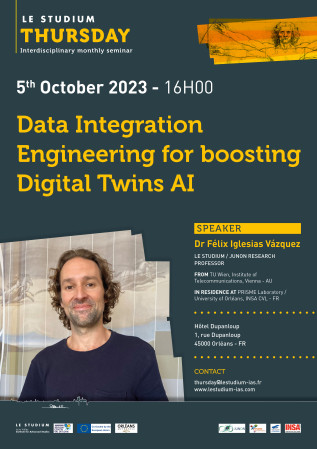Data Integration Engineering for boosting Digital Twins AI
Hôtel Dupanloup
1 rue Dupanloup
45000 Orleans
France
Presentation
Nowadays the possibilities of communications and data management technologies are immense. If we consider speed, ubiquity, interoperability, scalability, data integration and provision of services, we have reached a level of development we could only dream of just a few years ago. As a result, projects such as the development of digital twins for the application of AI in natural environments are now imaginable.
In a nutshell, a digital twin is a virtual representation of a real-world physical object, person of process, that monitors and retains the fundamental (i.e., of practical concern) characteristics of its physical counterpart. This enables actions related to prevention, prediction, prescription and experimentation in a safe and controlled way, which are primarily performed over the digital twin.
Within this context, creating a digital twin (or several digital twins) of natural resources in the Loire Valley is a challenge that, at least on its technological side, involves a broad number of participants. In design and prototype-testing phases, these participants are mainly scientific and technological institutions in charge of providing data and knowledge about natural resources of the region (water, soil, air), as well as about the required digital infrastructures, processing algorithms and computational intelligence. In particular: the French Geological Survey (BGRM), the French National Centre for Scientific Research (CNRS), the University of Tours, and the Technical University of Orleans (OVLT).
Under the supervision of Prof. Frédéric Ros (OVLT), our contribution to the project is, first, to define a base communication and data management structure underlying the digital twin. Such structure should seamlessly integrate data sources, users, advanced analysis, and artificial learning resources. Second, to help establish AI applications that leverage the potential of the digital twin.
Precisely due to recent advances in data integration and big data technologies, as well as the heterogeneity in cases, scenarios and resources, the design of such a base infrastructure involves a high level of complexity and must be carefully carried out to facilitate flexible, affordable, efficient and sustainable digital environments over time. Nevertheless, the effort is worthwhile. The ultimate achievement of a digital twin that virtualizes a region's natural resources will enable advances in many fields, namely: health and welfare, disaster risk reduction, pollution control, biodiversity protection, environmental sustainability, smart farming and agriculture, etc.
Speaker
LE STUDIUM / JUNON Research Professorship
FROM: TU Wien, Institute of Telecommunications, Vienna - AU
IN RESIDENCE AT: PRISME Laboratory / University of Orléans, INSA CVL - FR







